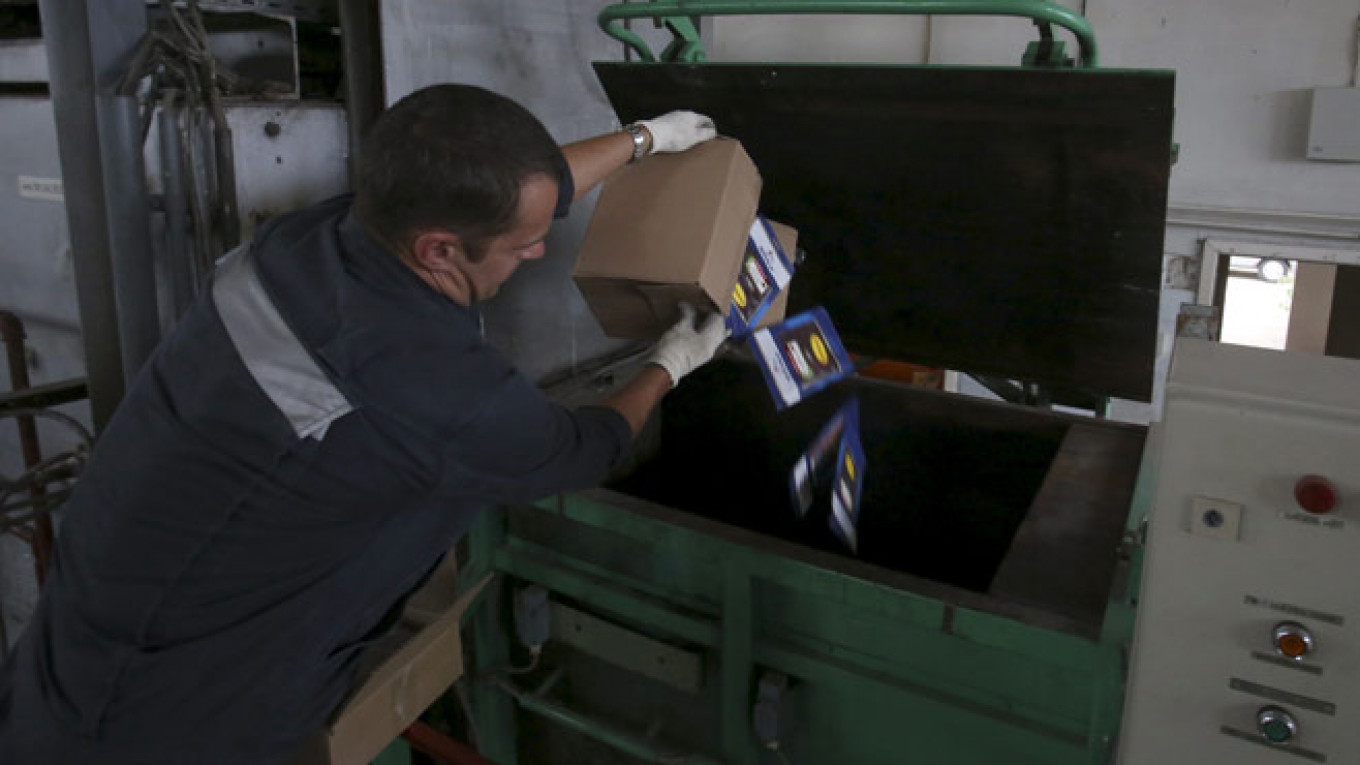Those of us who grew up with grandparents who were around during the tough times of the Soviet Union know that food isn't a subject to take lightly.
Starvation and deprivation weren't abstract concepts to Soviet people — even privileged Soviet people — just a couple of generations ago.
Perhaps this is why there is something so terrifying, so visceral, in seeing gleeful mass destruction of banned Western food imports taking place across Russia following a presidential decree.
So far, a petition to stop destroying food imports has gathered over 300,000 signatures at Change.org.
Even Kremlin allies, including some Orthodox clergy and conservative journalists, have expressed dismay at television footage of cheese being bulldozed and bacon being incinerated.
The Kremlin itself is unmoved. Much like the notorious Dima Yakovlev Law, which banned adoptions of Russian orphans by Americans, destruction of food is likely a matter of pride. The anguish of children and their potential parents didn't figure into President Vladimir Putin's calculus. What mattered was showing the Americans how Russia is willing to use its own children in an international battle of wills, and that Russia will not blink, nor shed a tear.
Similar logic appears to be at work now that illegal imports are being torched. Food price inflation has risen over 20 percent in Russia since imports bans were introduced as a counter-measure to sanctions. The percentage of Russians living below the poverty line this year jumped to 16 percent in the first quarter of 2015. That's an extra 3.1 million living in poverty, bringing the total of impoverished Russians to nearly 23 million.
Naturally, the Kremlin now needs to show that it won't bat an eyelash. The imports bans themselves had a practical dimension: Russia was clearly hoping to put pressure on the European agricultural sector, and consequentially get some leverage on the EU.
Destruction of the imports is being mostly done for spectacle — though it can be argued that it is also a means of discouraging corrupt officials from selling banned items (or, for that matter, feasting on them).
Either way, the destruction of food doesn't look good. But the Kremlin isn't interested in looking good. It's interested in looking tough.
In fact, the Kremlin is so wedded to its tough image that it missed a brilliant PR opportunity. In spite of its very decent funding, Russian propaganda is failing. According to the Pew Research Center, Russia's image is woefully behind that of the United States — in all parts of the world.
Russian propaganda keeps insisting that Russia is trying to stand up to U.S. hegemony and create a multipolar world. But the thing about living in a multipolar world is that you can't always be reactive. You must be proactive. You must offer something. What exactly is Russia offering to the world en masse? Oil? Weapons? UN vetoes? Food crematoria?
None of that boosts a country's foreign policy agenda. All of this illegal food is trying to make its way into Russia while there are plenty of places in the world where hunger and malnutrition are a real threat. Why not take the food, check it, re-certify it, and donate it to places like Haiti and Namibia? This would enhance Russia's image much better than a thousand television segments alleging that the U.S. is ruled by lizard people and the Illuminati.
What exactly would Russia have to lose? Money? It's not as if the new food incinerators the government is buying are cheap. This is precisely why destroying food at a time like this isn't just immoral, it's downright stupid. The mindless zeal with which Russian officials are destroying foreign food also makes you wonder what else these people are capable of.
Will they soon be turning off foreign-made life support machines across the nation's ICUs while everyone applauds?
Natalia Antonova is an American playwright and journalist.
A Message from The Moscow Times:
Dear readers,
We are facing unprecedented challenges. Russia's Prosecutor General's Office has designated The Moscow Times as an "undesirable" organization, criminalizing our work and putting our staff at risk of prosecution. This follows our earlier unjust labeling as a "foreign agent."
These actions are direct attempts to silence independent journalism in Russia. The authorities claim our work "discredits the decisions of the Russian leadership." We see things differently: we strive to provide accurate, unbiased reporting on Russia.
We, the journalists of The Moscow Times, refuse to be silenced. But to continue our work, we need your help.
Your support, no matter how small, makes a world of difference. If you can, please support us monthly starting from just $2. It's quick to set up, and every contribution makes a significant impact.
By supporting The Moscow Times, you're defending open, independent journalism in the face of repression. Thank you for standing with us.
Remind me later.








